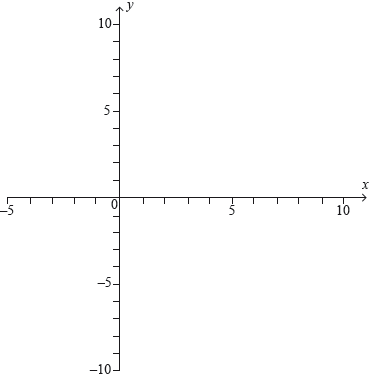| Date | May 2022 | Marks available | 3 | Reference code | 22M.2.SL.TZ2.3 |
| Level | Standard Level | Paper | Paper 2 | Time zone | Time zone 2 |
| Command term | Find | Question number | 3 | Adapted from | N/A |
Question
The Voronoi diagram below shows four supermarkets represented by points with coordinates , , and . The vertices , , are also shown. All distances are measured in kilometres.
The equation of is and the equation of is .
The coordinates of are and the coordinates of are .
A town planner believes that the larger the area of the Voronoi cell , the more people will shop at supermarket .
Find the midpoint of .
Find the equation of .
Find the coordinates of .
Determine the exact length of .
Given that the exact length of is , find the size of in degrees.
Hence find the area of triangle .
State one criticism of this interpretation.
Markscheme
(M1)
A1
Note: Award A0 if parentheses are omitted in the final answer.
[2 marks]
attempt to substitute values into gradient formula (M1)
(A1)
therefore the gradient of perpendicular bisector is (M1)
so A1
[4 marks]
identifying the correct equations to use: (M1)
and
evidence of solving their correct equations or of finding intersection point graphically (M1)
A1
Note: Accept an answer expressed as “”.
[3 marks]
attempt to use distance formula (M1)
A1
[2 marks]
METHOD 1 (cosine rule)
length of is (A1)
Note: Accept and .
attempt to substitute into cosine rule (M1)
(A1)
Note: Award A1 for correct substitution of , , values in the cos rule. Exact values do not need to be used in the substitution.
A1
Note: Last A1 mark may be lost if prematurely rounded values of , and/or are used.
METHOD 2 (splitting isosceles triangle in half)
length of is (A1)
Note: Accept and .
required angle is (M1)(A1)
Note: Award A1 for correct substitution of (or ), values in the cos rule. Exact values do not need to be used in the substitution.
A1
Note: Last A1 mark may be lost if prematurely rounded values of , and/or are used.
[4 marks]
(area =) OR (area =) (M1)
A1
[2 marks]
Any sensible answer such as:
There might be factors other than proximity which influence shopping choices.
A larger area does not necessarily result in an increase in population.
The supermarkets might be specialized / have a particular clientele who visit even if other shops are closer.
Transport links might not be represented by Euclidean distances.
etc. R1
[1 mark]
Examiners report
Part (a) was answered very well and demonstrated that the candidates had good knowledge of the midpoint formula. Some candidates did not write the midpoint they found as a coordinate pair and lost a mark there. Part (b) was answered well. Most candidates were able to find the gradient of [BD] and then the gradient of the perpendicular [XZ] and its equation. Candidates who lost marks in (b) were able to collect follow through marks in parts (c), (d), and (e). In part (c), not all candidates were able to identify the correct equations that they needed to find the coordinates of point X. In part (d), many candidates overlooked the fact that the question called for the exact length of [YZ] – the majority of candidates gave the answer correct to three significant figures and hence lost a mark. In part (d) most candidates were able to correctly use the cosine rule. Marks were lost here if the candidates calculated the length of [XZ] incorrectly, or substituted the [XZ], [YZ] or [XY] values incorrectly. Often candidates used rounded [XZ], [YZ] or [XY] values prematurely, for which they lost the last mark. Part (f) was mostly well answered. If candidates found an angle in part (e), they were usually able to find the area in (f) correctly. Again, the contextual question in part (g) was challenging to many candidates. Some answers showed misconceptions about Voronoi diagrams, for example some candidates stated that “if the cell were larger, then some people living there will be much closer to supermarkets A, B, C than to supermarket D.” Many candidates offered explanations, which were long and unclear, which often did not address the issue they were asked to comment on, nor displayed a sound understanding of the topic.


